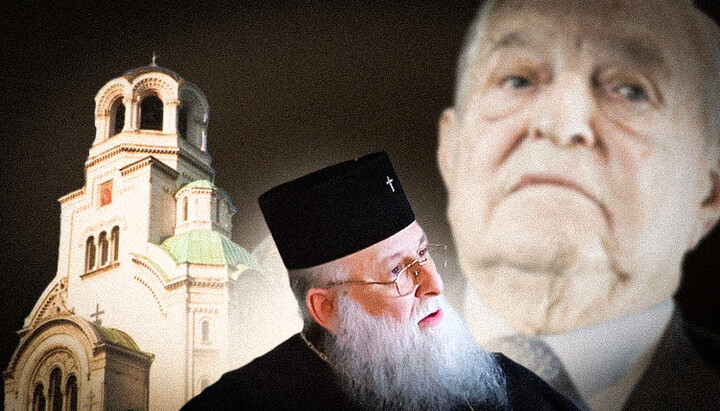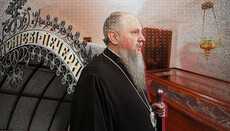The Bulgarian attempt at schism: a failed imitation of Ukraine?

Bulgaria's authorities are facing a dilemma: to legalize the Old Calendar schismatic Orthodox structure or not?
The decision of the Bulgarian Supreme Court of Cassation to register the "Bulgarian Orthodox Old Calendar Church" came as a complete surprise to external observers (such as we are). Apparently, for Bulgarians, too. In the public and ecclesiastical fields of the country this decision caused a storm of indignation – both on the part of the canonical Bulgarian Church and some political and social forces.
After 15 years of legal battles, the Old Calendarists received official recognition, which many believe, first, threatens the unity of the Bulgarian Orthodox Church, and second, weakens its influence over the processes occurring in the country. What led to this decision, and what consequences does it have for the Orthodox Bulgarians? Let’s try to understand.
Legal justice or a blow to the canonical Church?
The main reason for the Old Calendarists’ separation from the Bulgarian Patriarchate was the church calendar reform of 1968, which ultimately led to the creation of an alternative church structure in 1990 (so for 22 years everything was fine, but then someone decided the situation needed to change). To date, the Old Calendar Church has three "bishops", one monastery with 60 nuns, and 18 parishes, including a cathedral in Sofia. The community is led by "Metropolitan" Photius of Triaditsa.
Since 2009, the "Old Calendar Church" has done everything possible to gain registration, but without success. However, on 31 December 2024, the Bulgarian Supreme Court of Cassation, overturning the decisions of the Sofia City and Appellate Courts, allowed the registration of the Old Calendar Orthodox Church. The court noted that the registration of a new religious community did not infringe upon the rights of the canonical Bulgarian Orthodox Church and its members. The ruling highlighted the historical and spiritual role of the Bulgarian Patriarchate, which was likely intended to "calm" the dissatisfied parties. However, the judicial recognition of the right to exist of a community adhering to a different calendar style is unlikely to bring peace. This decision removes the administrative and legal barriers limiting the activities of the Old Calendarists in Bulgaria. In other words, the schismatics can now claim equality with the canonical Church and, in the event of a change in political leadership or the country's course, even claim to be the "truly popular" and most "patriotic" religious organization.
Reaction
For this reason, the Holy Synod of the Bulgarian Patriarchate stated that the creation of a parallel jurisdiction is a direct violation of the sacred canons and a threat to the unity of the Church. Additionally, according to the Synod, such a court decision creates a dangerous precedent, opening the door for the registration of other schismatic groups.
In turn, Patriarch Daniil of Bulgaria emphasized that two Orthodox Churches cannot exist on the same canonical territory. According to him, the state legalization of the Old Calendarists could become the beginning of the destruction of not only ecclesiastical but also social unity. It is clear that this court decision may become a tool for political influence. As Bulgarian President Rumen Radev said, the state must ensure conditions for the unity of the Church, considering threats to it as threats to national sovereignty.
In other words, both church and political leaders understand perfectly well that the "Ukrainian scenario", where a church schism was used to achieve political goals, may be applied in Bulgaria as well. The question is, who and why might use it?
What Is Yonko Grozev?
The decision to register the Bulgarian Old Calendar Orthodox Church was made not by faceless structures but by specific individuals working at the European Court of Human Rights. The central figure in this process was Yonko Grozev, a Bulgarian judge at the European Court of Human Rights, closely associated with George Soros and his organization "Open Society".
Yonko Grozev was appointed as a judge at the ECHR in 2015 after the then Bulgarian judge in Strasbourg, Zdravka Kalaydjieva, resigned early to free up the position for him. Grozev was directly linked to Bulgaria's Justice Minister Hristo Ivanov, who was known for his support of Soros-funded structures. Prior to this (since 1993), Grozev had been a lawyer and one of the co-founders of the Bulgarian Helsinki Committee (BHC), which actively promoted Soros's "Open Society" ideas and was financed by him.
Interestingly, at the beginning of 2020, independent French lawyers accused Grozev of serving Soros's interests in ECHR cases involving a number of European countries. This led to the collection of more than 9,500 signatures on a petition calling for his removal from the court due to numerous conflicts of interest, which had become routine in his work. However, instead of facing punishment, senior European officials decided to appoint Grozev to a higher position at the ECHR.
It was Grozev who made the decision that Bulgarian Old Calendarists have the right to legal registration in the country. The interests of the Old Calendarists at the ECHR were represented by lawyer Natasha Dobreva. Her name is another link in the chain of people behind the legalisation of the Bulgarian schism. Dobreva and Grozev were not only colleagues but also long-time business partners, working together for nine years, from 2006 to 2015, at the law firm "Grozev and Dobreva", representing the interests of the Soros-funded Bulgarian Helsinki Committee.
Thus, the ECHR's decision regarding the Bulgarian schism clearly involves a conflict of interest between the judge and the lawyer, and there is a noticeable trace of the organisations funded by George Soros. The question is, why do the people representing these organisations need all this?
Who benefits from this?
It should be immediately noted that the ECHR's ruling on the Old Calendar Church in Bulgaria indicates that from now on, any group calling itself "Orthodox" can claim legalization, which will undoubtedly lead to the further fragmentation of the religious unity of the country.
At the same time, as the Bulgarian Orthodox Church emphasizes, this situation could lead to a breach of not only spiritual but also national security in Bulgaria. This is particularly true because Soros-funded international structures may not only intervene but will certainly do so in the country's politics (there are many examples of this).
Moreover, this move to legalize the schismatics is most likely part of a broader plan aimed at weakening the canonical Bulgarian Orthodox Church and its influence in the country. This is why, given the above, we can draw certain conclusions from the situation.
Firstly, the creation of a parallel church structure in Bulgaria could be used as political pressure on the BOC. For example, they could exert pressure on the Church regarding the recognition of the OCU, threatening to withdraw state support and public trust if the Church refuses. This scenario was successfully implemented in Ukraine and could easily be repeated in Bulgaria.
Secondly, the registration of the Old Calendar BOC poses a threat to the unity of Orthodox believers in Bulgaria. The division of parishioners between two legally recognized structures and the political support of the schismatics will undoubtedly undermine the authority of the canonical Church, which has been the pillar of Bulgarian identity and culture for centuries. This will gradually weaken the role of the BOC in society, making it more "negotiable" in the eyes of those behind this situation.
Thirdly, the creation of a parallel Church opens the door for the use of the "religious factor" in political purposes – exactly the same scenario that has already been successfully applied in Ukraine. Politicians seeking to strengthen their positions or weaken their opponents can support one side of the conflict, as was done in our country. Those around Soros understand well that religious conflicts can become a powerful tool for manipulation, leading to the fragmentation of society and further receiving their piece of the "political pie".
Fourthly, these conclusions are confirmed by the very name used by the Old Calendarists. It completely mirrors the name of the canonical Bulgarian Orthodox Church. This is exactly how the schismatics in Ukraine operate, creating parallel structures with state support and then claiming churches and monasteries of the canonical Church. Furthermore, Bulgarian Old Calendarists are already using the same tactics that representatives of the Ukrainian Orthodox Church of the Kyiv Patriarchate once used. For example, in a recent interview, the leader of the Old Calendar Church, "Metropolitan" Photius, expressed doubts about the canonical nature of the election of bishops of the Bulgarian Patriarchate, implying that the election was conducted under the control of the Bulgarian communist authorities. The logic of such a statement is obvious and painfully familiar to us, Ukrainians. According to this narrative, the canonical Church is first accused of dependence on government authorities, then its bishops are portrayed as "KGB agents", and next, the schismatics, the "true patriots", claim their place – with the only goal of destroying the canonical Church. This scenario is simple but works well, as we can see on the example of Ukraine.
Fifthly, the registration of the Old Calendar BOC indicates the desire of certain forces to place the Church under political control. This desire could lead to a disaster for both the religious and social life of the country because attempts to use the Church as a tool for political gain threaten to cause a deep crisis in public life.
At the end of 2024, representatives of the Bulgarian Old Calendar Orthodox Church applied for registration, but on 27 December, they were denied. According to the Minister of Justice, the reason for the denial was the failure of the applicants to provide the necessary documents. Given the intense attention this issue is receiving, the procedural refusal to register does not seem very convincing. Most likely, the "Old Calendar saga" will continue.
Unfortunately, just as in the case with Ukraine, there are enough politicians in Bulgaria who believe the Church can be used for their own benefit. They do not think about the good of the country, the lives of ordinary people, or the Church as a religious structure. They are willing to sacrifice all of this to please their masters, whose sole goal is to gain maximum influence and power, not just in a single country, but worldwide.
Bulgaria needs to seriously think about its future, as it may soon cease to be bright...











